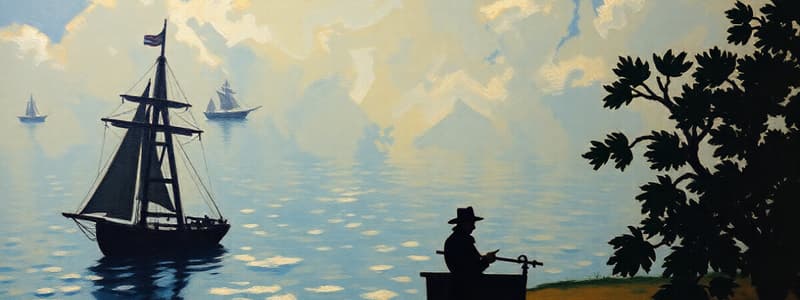Podcast
Questions and Answers
Quels éléments classiques ont contribué aux rapports interétatiques de l'Antiquité ?
Quels éléments classiques ont contribué aux rapports interétatiques de l'Antiquité ?
Quel événement a marqué la fin de l’Empire romain d’Occident ?
Quel événement a marqué la fin de l’Empire romain d’Occident ?
Quelles institutions ont été inventées par les Grecs au cours de leur période de développement international ?
Quelles institutions ont été inventées par les Grecs au cours de leur période de développement international ?
Comment la conception romaine du droit international diffère-t-elle des approches antérieures ?
Comment la conception romaine du droit international diffère-t-elle des approches antérieures ?
Signup and view all the answers
Quel changement majeur a eu lieu concernant les relations internationales au 11ème siècle ?
Quel changement majeur a eu lieu concernant les relations internationales au 11ème siècle ?
Signup and view all the answers
Quel concept a été introduit au moment de la division entre le droit de la guerre et le droit de la paix ?
Quel concept a été introduit au moment de la division entre le droit de la guerre et le droit de la paix ?
Signup and view all the answers
Quel événement historique marque l'achèvement de l'unification territoriale en France sous Louis XI ?
Quel événement historique marque l'achèvement de l'unification territoriale en France sous Louis XI ?
Signup and view all the answers
Quelle est l'idée principale développée par Jean Bodin dans ses 'Six livres de la République' ?
Quelle est l'idée principale développée par Jean Bodin dans ses 'Six livres de la République' ?
Signup and view all the answers
Quels sont les deux aspects de la souveraineté selon Jean Bodin ?
Quels sont les deux aspects de la souveraineté selon Jean Bodin ?
Signup and view all the answers
Quel traité a consacré la souveraineté des États après la guerre de 30 ans ?
Quel traité a consacré la souveraineté des États après la guerre de 30 ans ?
Signup and view all the answers
Quel concept est clairement assimilé par Thomas Hobbes dans 'Le Léviathan'?
Quel concept est clairement assimilé par Thomas Hobbes dans 'Le Léviathan'?
Signup and view all the answers
Quel objectif est poursuivi par le principe de l'équilibre dans les relations interétatiques?
Quel objectif est poursuivi par le principe de l'équilibre dans les relations interétatiques?
Signup and view all the answers
Quelle a été une des conséquences des traités européens du 17ème au 19ème siècle?
Quelle a été une des conséquences des traités européens du 17ème au 19ème siècle?
Signup and view all the answers
Quel événement historique illustre la volonté d'atteindre un équilibre des forces entre les grandes monarchies européennes?
Quel événement historique illustre la volonté d'atteindre un équilibre des forces entre les grandes monarchies européennes?
Signup and view all the answers
Quelles sont les caractéristiques de la société internationale qui se sont développées au 19ème siècle?
Quelles sont les caractéristiques de la société internationale qui se sont développées au 19ème siècle?
Signup and view all the answers
Study Notes
Introduction
- Institutions are structures that govern entities.
- International relations concern interactions between states.
- International relations are an ancient, utopian concept, aiming to create an international society, a thought developed by Kant (1795).
§1: Emergence of International Society
- Ancient times were characterized by autonomy among communities.
- However, relations existed, particularly in large empires, indicating a move away from isolation.
- Classic foundations of interstate relations include: trade and treaties.
- Trade establishes initial legal frameworks.
- Treaties are agreements defining legal interactions between parties.
The Greek Period
- The Greek period was vital for international development.
- Three key innovations were created: proxenies (consular protection), amphictyonies (religiously-motivated city alliances), and symmachies (military alliances).
The Roman Period
- Rome had a different approach to international relations, characterized by conquest and limited treaty usage.
- Rome's influence on international law was limited due to their policy of conquest.
- A context of war caused the gradual disappearance of international relations.
New Dimensions of International Relations
- The 11th century saw the re-emergence of international relations, with maritime trade driving more connections.
- Distinctions arose between peace and war, with the concept of just war based on Christian principles emerging.
- Papal arbitration represented an early form of conflict resolution.
Appearance of Sovereign States
- The late 15th century witnessed the unification of France. The struggle involved overcoming external (papal) and internal (feudal) constraints.
- Jean Bodin's Six Books of the Republic (1576) discussed sovereignty as an essential element of states.
- Sovereignty implies absolute authority within a state's borders and exclusive control over the use of force.
Treaties of Westphalia (1648)
- The Thirty Years' War ended with the Treaties of Westphalia.
- These treaties established a new European order, defining sovereignty and equality among states.
- Traditionally-recognized international relations emerged, creating a basis for modern international law.
The Search for Balance
- The 17th, 18th and 19th centuries saw a struggle for balance amid ongoing territorial disputes.
- Attempts at conflict resolution, including arbitration, emerged.
- The Congress of Vienna (1814-1815) and the Berlin Conference (1885) showcased attempts to manage international relations in Europe.
§2: Rise of International Society
- The 19th century witnessed a quantitative increase in treaties.
- Multilateral treaties also emerged, reflecting expanded areas of international cooperation.
- Mechanisms for conflict resolution were sought, with the Hague Conferences (1899, 1907) being pivotal events.
New Actors
- New non-state actors like NGOs and multinational corporations gained importance in international affairs.
- NGOs have independent activity, but their legal frameworks differ based on their creation location.
- International relations also involve various private actors like non-state armed groups.
Crises and Evolution
- Contemporary international law faces critique.
- This includes questioning efficiency.
- Increased multilateralism in the 20th and 21st centuries. The international system's evolution reflects the shifts in power dynamics and actors on the world stage.
Studying That Suits You
Use AI to generate personalized quizzes and flashcards to suit your learning preferences.




